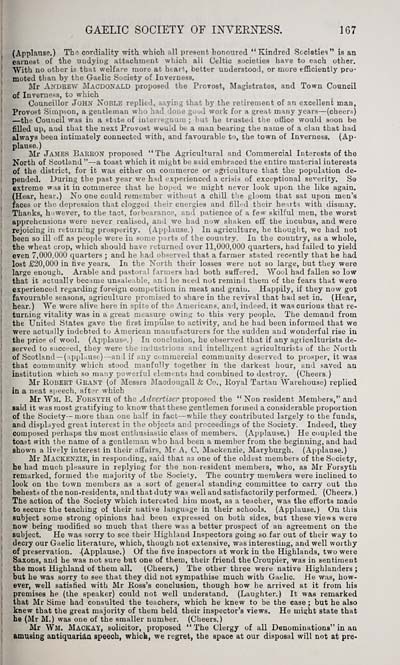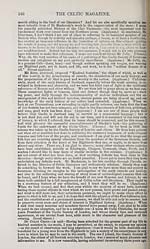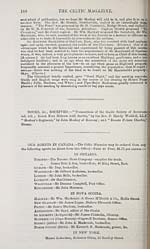Blair Collection > Celtic magazine > Volume 5
(177)
Download files
Complete book:
Individual page:
Thumbnail gallery: Grid view | List view

GAELIC SOCIETY OF INVERNESS. 167
(Applause.) Ths cordiality with which all present honoured "Kindred Sccietie"*" is an
earnest of the uudyiug attachment which all Celtic societies have to each other.
With no otber is that welfare more at heart, better understood, or more efficiently pro-
moted til an by the Gaelic Society of Inverness,
Mr Andbew Macdonald proposed the ProTost, Magistrates, and Town Council
of Inverness, to which
Councillor JoHN NoBLE replied, saying that by the retirement of an excellent man.
Provost Simpson, a gentleman who had done gujj work for a great many years — (cheers)
— thi- Council was in a st ite of iuteriegiiuiu ; but he trusted the office would soon be
filled up, aud that the next Provost would be a man bearing the name of a clan that had
always been intimately connected with, and favourable to, the town of Inverness. (Ap-
plause.)
Mr James Barron proposed "The Agricultural and Commercial Interests of the
North of Scotland "—a toast which it might be said embraced the entire material interests
of the district, for it was either on commerce or agriculture that the population de-
pended. During the past year we hud experienced a crisis of exceptional severity. So
extreme was it in commerce that he hoped we might never look upon the like again.
(Hear, hear.) No one could remember without a chill the gloom that sat upon men's
faces or the depression that clogged their energies and fill-^d their heats with dismay.
Thanks, however, to the taot, forbearance, and patience of a few skilful men, the worst
apprehensions were never realised, and we had nuw shaken off the incubus, and were
rejoicing in retaining prosperity. (Applause.) In agriculture, he thought, we had not
been so ill off as people were in some pnrts of the country. In the country, as a whole,
the wheat crop, which should have returned over 11,000,000 quarters, had failed to yield
even 7,000,000 quarters ; and he had observed that a farmer stated recently that he had
lost £20,000 in tive years. In the North their losses were not so large, but they were
large enough. Arable and pastiual fanners had both suffered. AVool had fallen so low
that it actually becime unsaleable, an I he need not remind them of the fears that were
experienced regarding foreign competition in meat and graiu. Happily, if they now got
favourable seasons, agriculture promised to share in the revival that had set in. (Hear,
hear.) We were alive here in spite of the Americans, an'l, indeed, it was curious that re-
turning vitality was in a great measure owing to this very people. The demand from
the United States gave the first impulse to activity, and he had been informed that we
were actually indebted to American manufacturers for the sudden and wonderful rise la
the price of wool. (Applause.) In conclusion, he observed that if any agticalturists de-
served to succeed, they were the industrious aud intelh,;4ent agriculturists of the North
of Scotland— (applause)— an 1 if any commercial community deserved to prosper, it was
that community which stood manfully together in the darkest hour, and saved an
institution which so many powerful elements had combined to destroy. (Cheers.)
Mr Egbert Grant (of Messrs iMacdougall & Co., Royal Tartan Warehouse) replied
in a neat speech, aft.^r which
Mr Wji. B. Forsyth of the Advertiser proposed the " Non resident Members," and
said it was most gratifying to know that these gentlemen formed a considerable proportion
of the Society— more than one half in fact^while they contributed largely to the funds,
and displayed great interest in the objects and proceedings of the Society. Indeed, they
composed perhaps the most enthusiastic class of members. (Applause.) He coupled the
toast with the name of a gentleman who had been a member from the beginning, and had
shown a lively interest in their affairs, Mr A. C. Mackenzie, Maryburgh. (Applause.)
Mr Mackenzie, in responding, said that as one of the oldest members of the Society,
he had much pleasure in replying for the nonresident members, who, as Mr Forsyth
remarked, formed the majority of the Society. The country members were inclined to
look on the town members as a sort of general standing committee to carry out the
behests of the non-residents, and that duty was well and satisfactorily performed. (Cheers.)
The action of the Society which interested him most, as a teacher, was the efforts made
to secure the teaching of their native language in their schools. (Applause.) On this
subject some strong opinions ha^l been expressed on both sides, but these views were
now being modified so much that there was a better prospect of an agreement on the
subject. He was sorry to see their Highland Inspectors going so far out of their way to
decry our Gaelic literature, which, though not extensive, was interesting, and well worthy
of preservation. (Applause.) Of the five inspectors at work in the Highlands, two were
Saxons, and he was not sure but one of them, their friend the Croupier, was in sentiment
the most Highland of them all. (Cheers.) The other three were native Highlanders;
but he was sorry to see that they did not sympathise much with Gaelic. He was, how-
ever, well satisfied with Mr Boss's conclusion, though how he arrived at it from his
premises he (the speaker) could not well understand. (Laughter.) It was remarked
that Mr Sime had consulted the teachers, which be knew to be the case ; but he also
knew that the great majority of them held their inspector's views. He might state that
he (Mr M.) was one of the smaller number. (Cheers.)
Mr Wm. Mackat, solicitor, proposed "The Clergy of all Denominations" in an
ftmasing antiquarida speech, whick, we regret, the space at our disposal will not at pre-
(Applause.) Ths cordiality with which all present honoured "Kindred Sccietie"*" is an
earnest of the uudyiug attachment which all Celtic societies have to each other.
With no otber is that welfare more at heart, better understood, or more efficiently pro-
moted til an by the Gaelic Society of Inverness,
Mr Andbew Macdonald proposed the ProTost, Magistrates, and Town Council
of Inverness, to which
Councillor JoHN NoBLE replied, saying that by the retirement of an excellent man.
Provost Simpson, a gentleman who had done gujj work for a great many years — (cheers)
— thi- Council was in a st ite of iuteriegiiuiu ; but he trusted the office would soon be
filled up, aud that the next Provost would be a man bearing the name of a clan that had
always been intimately connected with, and favourable to, the town of Inverness. (Ap-
plause.)
Mr James Barron proposed "The Agricultural and Commercial Interests of the
North of Scotland "—a toast which it might be said embraced the entire material interests
of the district, for it was either on commerce or agriculture that the population de-
pended. During the past year we hud experienced a crisis of exceptional severity. So
extreme was it in commerce that he hoped we might never look upon the like again.
(Hear, hear.) No one could remember without a chill the gloom that sat upon men's
faces or the depression that clogged their energies and fill-^d their heats with dismay.
Thanks, however, to the taot, forbearance, and patience of a few skilful men, the worst
apprehensions were never realised, and we had nuw shaken off the incubus, and were
rejoicing in retaining prosperity. (Applause.) In agriculture, he thought, we had not
been so ill off as people were in some pnrts of the country. In the country, as a whole,
the wheat crop, which should have returned over 11,000,000 quarters, had failed to yield
even 7,000,000 quarters ; and he had observed that a farmer stated recently that he had
lost £20,000 in tive years. In the North their losses were not so large, but they were
large enough. Arable and pastiual fanners had both suffered. AVool had fallen so low
that it actually becime unsaleable, an I he need not remind them of the fears that were
experienced regarding foreign competition in meat and graiu. Happily, if they now got
favourable seasons, agriculture promised to share in the revival that had set in. (Hear,
hear.) We were alive here in spite of the Americans, an'l, indeed, it was curious that re-
turning vitality was in a great measure owing to this very people. The demand from
the United States gave the first impulse to activity, and he had been informed that we
were actually indebted to American manufacturers for the sudden and wonderful rise la
the price of wool. (Applause.) In conclusion, he observed that if any agticalturists de-
served to succeed, they were the industrious aud intelh,;4ent agriculturists of the North
of Scotland— (applause)— an 1 if any commercial community deserved to prosper, it was
that community which stood manfully together in the darkest hour, and saved an
institution which so many powerful elements had combined to destroy. (Cheers.)
Mr Egbert Grant (of Messrs iMacdougall & Co., Royal Tartan Warehouse) replied
in a neat speech, aft.^r which
Mr Wji. B. Forsyth of the Advertiser proposed the " Non resident Members," and
said it was most gratifying to know that these gentlemen formed a considerable proportion
of the Society— more than one half in fact^while they contributed largely to the funds,
and displayed great interest in the objects and proceedings of the Society. Indeed, they
composed perhaps the most enthusiastic class of members. (Applause.) He coupled the
toast with the name of a gentleman who had been a member from the beginning, and had
shown a lively interest in their affairs, Mr A. C. Mackenzie, Maryburgh. (Applause.)
Mr Mackenzie, in responding, said that as one of the oldest members of the Society,
he had much pleasure in replying for the nonresident members, who, as Mr Forsyth
remarked, formed the majority of the Society. The country members were inclined to
look on the town members as a sort of general standing committee to carry out the
behests of the non-residents, and that duty was well and satisfactorily performed. (Cheers.)
The action of the Society which interested him most, as a teacher, was the efforts made
to secure the teaching of their native language in their schools. (Applause.) On this
subject some strong opinions ha^l been expressed on both sides, but these views were
now being modified so much that there was a better prospect of an agreement on the
subject. He was sorry to see their Highland Inspectors going so far out of their way to
decry our Gaelic literature, which, though not extensive, was interesting, and well worthy
of preservation. (Applause.) Of the five inspectors at work in the Highlands, two were
Saxons, and he was not sure but one of them, their friend the Croupier, was in sentiment
the most Highland of them all. (Cheers.) The other three were native Highlanders;
but he was sorry to see that they did not sympathise much with Gaelic. He was, how-
ever, well satisfied with Mr Boss's conclusion, though how he arrived at it from his
premises he (the speaker) could not well understand. (Laughter.) It was remarked
that Mr Sime had consulted the teachers, which be knew to be the case ; but he also
knew that the great majority of them held their inspector's views. He might state that
he (Mr M.) was one of the smaller number. (Cheers.)
Mr Wm. Mackat, solicitor, proposed "The Clergy of all Denominations" in an
ftmasing antiquarida speech, whick, we regret, the space at our disposal will not at pre-
Set display mode to: Large image | Transcription
Images and transcriptions on this page, including medium image downloads, may be used under the Creative Commons Attribution 4.0 International Licence unless otherwise stated. ![]()
| Early Gaelic Book Collections > Blair Collection > Celtic magazine > Volume 5 > (177) |
|---|
| Permanent URL | https://digital.nls.uk/76450999 |
|---|
| Description | Volume V, 1880. |
|---|---|
| Shelfmark | Blair.6 |
| Attribution and copyright: |
|
| Description | A selection of books from a collection of more than 500 titles, mostly on religious and literary topics. Also includes some material dealing with other Celtic languages and societies. Collection created towards the end of the 19th century by Lady Evelyn Stewart Murray. |
|---|
| Description | Selected items from five 'Special and Named Printed Collections'. Includes books in Gaelic and other Celtic languages, works about the Gaels, their languages, literature, culture and history. |
|---|

